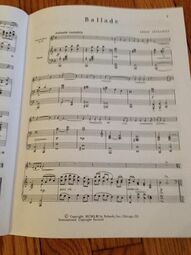Recently, a freshman in my youth ministry asked me to accompany her for a solo and ensemble competition. Eager for some face time with this student, I agreed.
Later, this student agreed to play this piece in worship.
A few days after that, she came running into the youth room and said, “When you asked me to play in worship, you meant the piece we did at confirmation, right?”
Not understanding, I responded, a bit dumbfounded, “Nope, I meant your solo and ensemble piece,” to which this girl cried, “But that piece has nothing to do with church!”
 When I asked her what she meant, this girl explained how the piece she learned for confirmation was church-appropriate because it was called “Lamb of God”. In contrast, the piece we’re playing for her competition – one that’s more beautiful and complex than “Lamb of God” – is called “Ballade”. Without God or Jesus in its title, this girl couldn’t understand how this piece would be suitable for church.
When I asked her what she meant, this girl explained how the piece she learned for confirmation was church-appropriate because it was called “Lamb of God”. In contrast, the piece we’re playing for her competition – one that’s more beautiful and complex than “Lamb of God” – is called “Ballade”. Without God or Jesus in its title, this girl couldn’t understand how this piece would be suitable for church.
Without knowing it, this student expressed the age-old sacred verses secular debate that’s ingrained in so many church cultures. As she did, my heart broke. How is it that this freshman, who’s still uncertain about so many things related to her faith, is absolutely convinced that a musical piece without God or Jesus in its title cannot be played at church?
Unfortunately, this girl is not alone in this belief. In his book, You Lost Me, David Kinnaman shares how many of the interviews his team conducted among young Christians “focused on the false dichotomy between the church world and the outside world”. As a result of this dichotomy, young creatives often feel shut out by the church. When that happens, the church suffers.
What then can we do about this issue?